- Home
- Jeremy Robinson
Empire (A Jack Sigler Thriller Book 8) Page 5
Empire (A Jack Sigler Thriller Book 8) Read online
Page 5
“That was fun,” she said, when he was once more at her side. “Should have been A Plan.”
“Plan A,” he corrected. He unhooked the ascender and stuffed it back in his pack, while Bishop gathered up the rope into a coil, which she slung over her shoulder. “This was Plan B, because climbing up the side of a building like Batman may be fun, but it’s also very conspicuous.”
Bishop fought the urge to roll her eyes. King was right, of course. Although sometimes he was too cautious for her liking. Her brother was an exceptional leader, though. What was really bothering her was the fact that they were here at all. As far as she was concerned, rescuing Tom Duncan was their first priority. Their only priority. Julie Sigler was nothing to her but a name. Finding who the woman King had identified—questionably—as their long-dead sister was something that, in Bishop’s opinion at least, could wait.
Deep Blue’s voice sounded in her ear again. “There should be a maintenance door fifty yards from your location.”
“I see it,” King said.
“What if is another fake?” Bishop asked.
“Then we’ll have to go to Plan C. Cut our way into the ventilation system.”
“Nothing conspicuous about that. Maybe we should just go in front door.” She made a gun-shape with her finger. “You know, ask politely.”
“I doubt the rent-a-cop at the security desk will have the answers we want,” King replied. “But we can make that Plan D.”
Plans C and D proved unnecessary, however. The roof access door was not only unsecured, without any alarms or cameras, but it was propped open with a cinderblock. A pile of cigarette butts and a faint whiff of stale tobacco smoke at the doorway explained the evident lapse in security.
“Nice of them to leave door open,” Bishop remarked.
“Someone has a serious habit. Odds are good we might run into them on their way up for another nicotine break.” He drew his sound-suppressed sidearm, and said, “Stay frosty.”
Despite the display of firepower, Bishop knew the optimal outcome would be one where they did not need to fire a single shot. Their objective was to gather intel, not go on a killing spree. Nevertheless, Bishop drew her own sound-suppressed pistol. “Always.”
King approached the door and eased it open a few more inches until there was room enough for him to slip through. Bishop followed immediately and found herself on a metal staircase that descended about ten feet to an open catwalk suspended high above the warehouse floor. To either side, she could see the enormous conical reflectors of hanging, industrial-strength metal-halide lights. Only a few of them were turned on. They cast small islands of illumination in the sea of shadows that was the warehouse floor. Yet, despite the sparse light, one thing was immediately apparent.
“This is not server farm,” Bishop observed.
“Nope. Looks more like a Costco.”
King was not wrong. Directly below them were row after row of multi-tiered pallet racks, filled with stacked cardboard boxes wrapped in cellophane. They were too far away to make out the words stenciled on the containers, but the boxes, at least all those Bishop could see from where they were perched, were all nearly identical. “So is just warehouse?”
“Maybe.” King sounded unconvinced. “Cover me.”
He holstered his pistol and dropped flat on the catwalk, then lowered himself over the edge, down onto the closest pallet. Crouching there, he drew his KA-BAR knife, sliced open one of the boxes and inspected the contents. Bishop looked around, then leaned over to see what he had discovered.
“Recognize this?” King held up a small parcel, wrapped in a green camouflage pattern, which Bishop did indeed recognize immediately.
“That is…” She faltered for a moment as the English words to describe the familiar item escaped her. “Individualnovo Ratsiona Pitanee. How do you say? Food ration.”
“MREs,” King muttered.
“I ate this in Russian Army. Much superior to your MRE. The biscuits are…” She trailed off again, casting her gaze in either direction. There were hundreds of pallets, each one stacked with full cases of military food rations. She did a quick calculation. “This is enough to feed someone for a thousand years.”
“Or a thousand people for a year.” King stuffed the package back into the case. “Maybe even ten thousand.”
Bishop tried to wrap her head around this discovery. They had been prepared for the possibility that TSAR Data Solutions was not what it presented itself as, but she could not fathom why the shell company would put thousands of Russian military food rations in their warehouse. “Are they going to sell these?”
“I don’t think so. This is a supply depot.”
“Supply? For what?”
King didn’t answer the question. “We need to find out what else they’ve got here. Come on.”
He crawled to edge of the rack and then began climbing down the upright metal frame. Bishop hastened to catch up.
Down on the floor, the warehouse felt more like a claustrophobic maze. The towering racks were like castle walls, looming above her and blocking out most of the available light. King, his pistol once more drawn and held at the ready, gestured for her to follow. Then they headed down the long narrow space between the racks. He paused at the end, pivoting around the corner slowly, employing a technique known as ‘slicing the pie,’ where he scanned each new degree of visibility.
They continued in this fashion for several minutes, slicing every blind corner as they made their way down the transverse aisle. After passing several more racks like the first, the floor arrangement changed. Now, instead of pallets loaded with cardboard boxes, there were several more rows of enormous plastic tanks marked with Cyrillic letters that Bishop had no difficulty reading.
“Water.”
The vertical tanks, a dozen of them, were arranged in two back-to-back rows parallel to the last pallet rack. Each was large enough to contain a swimming pool worth of water, at least twenty thousand gallons. A quarter of a million gallons in all. Maybe more.
“Food and water,” King said, nodding in comprehension. “Enough to supply an army.”
“A Russian army.” The implications of the discovery made her dizzy. “But why?”
She thought she knew the answer, but it seemed too improbable, too crazy.
“An army may travel on its stomach, but they don’t fight that way. Let’s keep looking. If we find some ordnance—”
Before he could finish the sentence, the overhead lights abruptly flashed on. It took a moment for the metal-halide lamps to warm up to their optimal output, but even the faint change in illumination as the lamps came on was enough to put both of them on high alert.
“Time to go,” King said.
He darted back to the end of the aisle and edged around the tank, peering down the cross aisle into the unexplored depths of the warehouse. This time he took only a couple of slices of the pie before pulling back. He turned to Bishop and held up his hand, four fingers extended.
Four tangoes.
He then pointed down the aisle, the meaning of the gesture clear. Check the other end.
Bishop sprinted down the row, careful to roll from heel to toe with each step, minimizing the sound of her footfalls. She drew up short of the corner and then carefully sliced around the blind spot.
Four more men were moving up the transverse aisle. They wore casual attire—blue jeans and T-shirts—but there was nothing casual about their manner. All were tall and broad, hair cropped close or completely shaved, like soldiers. They walked in a tight tactical knot, clearing each row, just as a team of soldiers would do.
And they were armed. Like soldiers.
The four men carried compact submachine pistols with extended vertical magazines. Bishop couldn’t distinguish the exact make of their weapons with her quick glance, but there was something eerily familiar about the disciplined way the men carried themselves.
She backed away and then turned to King, shaking her head and holding up four fingers
just as he had done. King’s silent reply was immediate. He pointed to the rack behind them and then pointed up.
Climb.
Bishop holstered her pistol and leaped onto the pallet racks, scrambling up the metal frame like it was a piece of playground equipment. At the other end of the row, King did the same.
She was twenty feet above the floor, and about the same distance from the top of the rack, when the shooting started.
4
Alert, Nunavut Territory, Canada
Knight peered through the scope of his sniper rifle, searching the star-filled sky to the south of their position for any sign of the approaching aircraft. There was none. The helicopters—he was pretty sure that there were at least two—were running dark. There was no question that the birds were headed for CFS Alert. Where else was there to go?
The more important question was: why?
“Ghost time,” Queen said.
He did not have to ask what that meant, but vanishing like wraiths was a tall order under the circumstances. Their camouflage would afford some concealment and their temperature-controlled winter combat gear would make them virtually invisible to thermal scopes. But there was no hiding the almost two-mile long trail of footprints leading from their parked snow-machines, straight to the black site. And while their tracks might not be visible from the air, it wouldn’t take long for the men aboard those helicopters to spot them, once they were on the ground and searching the compound.
Queen said nothing more but started out at a run. Her snowshoes kicked up little puffs of frozen powder with each step, but she was careful to place her feet in the tracks they had left earlier. Doing so would not erase all signs of their presence, but it might serve to confuse the message left by their trail. Rook set out next, doing the same, though matching Queen’s shorter stride gave him an almost comical gait. Knight went last.
Since any radio transmission might betray their presence that much sooner, they did not speak, not that any of them would have been inclined to waste time or breath on idle conversation. While they were all in excellent physical condition, running in snowshoes was as much a test of skill as it was of athletic ability. Nevertheless, as Knight fell into a steady running rhythm, the many unanswered questions began to intrude on his thoughts.
Had they really missed Duncan by mere days, or even just a few hours? And if so, who had beat them to the black site? The leaked intel that had brought them to Alert might have been picked up by someone else as well. Who? Foreign spies? A rival domestic intelligence agency? A private sector organization with a grudge against Duncan or an interest in picking the brain of a former United States president? Any of the above might possess the resources to send a fully crewed submarine to break through the Arctic ice and put a team of commandos ashore to raid the black site.
But who was on the helicopters? Someone coming to find out why CFS Alert had gone dark? Or someone who knew the Chess Team was there? Someone who was hunting them?
Was it possible that this entire scenario was an elaborate trap designed to catch the team?
Seven months earlier, following Tom Duncan’s decision to surrender to federal authorities in a deal designed to protect the rest of them from prosecution, the commanding officer of the Joint Special Operations Command—the cross-branch military agency that had been the genesis of the Chess Team—had offered them all a chance to return to active duty, submitting once more to the chain of command. By unanimous accord, the five of them had refused, which effectively nullified the offer of amnesty. The JSOC commander, Admiral Ward, had elected not to pursue his legal options against them, though. It was tacit permission for them to continue battling enemies who were beyond the reach, to say nothing of the comprehension, of legitimate military units. But tolerating them was not the same thing as support.
Has something changed?
The roar of the jet turbines and the beat of rotor blades abruptly grew louder, as if the aircraft were about to pass directly overhead. Knight scanned the sky again and thought he saw a pair of black shapes moving in front of the star field. It could have just been his imagination, but the immediate change in the pitch and rhythm of the rotor noise, a Doppler-shifting as the source of the sound began moving away instead of toward him, strongly suggested it was not. The helicopters were headed for Alert, and they would be landing in a matter of seconds. It might take a while for the men in the helos to walk the site and realize that someone had come and gone, but they would eventually find the tracks leading out across the snowfield. And they would follow.
Knight judged they had covered less than a quarter of the distance to the spot where they had left the snowmobiles. With a little luck, they might be able to reach their rides before the hunt began in earnest, but what then?
One problem at a time, he told himself.
5
Ashburn, Virginia
The smell of burnt paper and gunpowder filled King’s nostrils as he reached the top of the rack. He rolled onto the six-foot-tall stack of boxes on the uppermost pallet, removing himself, temporarily at least, from the shooters’ direct line of sight. He could feel the cartons shuddering with each impact and all around him, bits of debris were exploding into the air, as some of the bullets grazed the corner edges. The packed Russian army rations would provide next-to-no cover whatsoever. The only way he and Bishop were going to survive this was to keep moving. Unfortunately, there was nowhere to go. The aisles separating the pallet racks were at least fifteen feet apart. It was a distance that he might be able to leap across with a running start, but under the circumstances, that wasn’t possible.
“King!” Bishop’s urgent voice sounded over the comms, but the open transmission also amplified the near constant crack of machine-pistol reports. “Coming your way. Cover me.”
He glanced down the length of the rack and saw her fast-crawling in his direction, surrounded by a cloud of smoke and debris.
Right, he thought. Cover you.
Trusting that Bishop knew what she was doing, he drew his pistol, extended the suppressor end a few inches out into the open, and started pulling the trigger. The .45 bucked in his awkward one-handed grip, sending the ACP rounds in a random spray, but accuracy wasn’t his primary goal. He was just trying to draw fire long enough for Bishop to do whatever it was she was trying to do. With the silencer masking both the noise and flash of each shot, it took the shooters below a few seconds to shift their fire toward him. But when the incoming storm of lead intensified, he knew he’d gotten their attention.
“King! Come to me!”
Bishop was close enough that she did not need to bother with the comms, just twenty feet away, but reaching her was easier said than done. He looked around frantically, searching for some way to draw the heat off him.
There was a small gap between the stack on which he lay and the back of the metal rack. Not enough room for him to slip down behind the cartons, and doing so would have been a bad idea under any circumstances, but it gave him an idea. He did a quick combat roll toward the narrow space and jammed his elbow down into it. The top layer of boxes shifted a little, widening the gap and allowing King to worm his way deeper, but the shrink wrap around the stack kept them more or less in place. He kept shoving and burrowing deeper, even as the storm of incoming fire continued without letup. None of the rounds made it all the way through, but King could still feel each impact, as if someone was relentlessly striking the side of the stack with a sledgehammer. He shoved and shifted, shoved and shifted again, and then he felt the entire stack begin to move.
He twisted around, braced his back against the boxes and pushed hard against the metal rack. His intention was to shove the entire load off the pallet and onto the floor, but at that moment, the cellophane wrap, which was perforated by innumerable bullets, tore loose, spilling just the upper three layers. The boxes tumbled off one-by-one, instead of falling as a single unit, but it was enough to momentarily disrupt the fusillade from below.
King scrambled up onto the
next pallet and saw Bishop, still a good fifteen feet away, crouching low and holding her pistol—
No, it’s not a pistol. It’s the grappling hook.
She played out a few feet of rope and then began whirling it overhand, lining up with one of the hanging lights. If she managed to snare it, she might be able to swing across Tarzan-style to the next row of pallet racks, but it was a big ‘if’ and an even bigger ‘might be.’
Her eyes met his for just a second, then her gaze shifted past him and locked on something just beyond him. He ducked before she could shout a warning, and then he threw himself to the side. He was a fraction of a second ahead of the shots that were coming, not from the floor but from the end of the rack.
The shooters knew what they were doing. While the bulk of the element had maintained suppressive fire to keep them pinned down, someone had climbed up the end of the rack in a classic flanking maneuver.
King flipped onto his back, and even though he knew it was probably already too late, he raised his pistol to return fire. Before he could get a shot off, and before his would-be killer—a hulking man with a bullet-shaped head and wearing a T-shirt that could barely contain his biceps—could adjust his aim, something flashed through the air above King. The shooter ducked reflexively as the projectile arced toward his head, but he evidently did not see the rope attached to it. That rope landed on his shoulder a fraction of a second later, and then snapped taut as Bishop hauled in the slack with a sharp jerk.
The man was yanked off his feet, the hook set deep into his trapezius muscle between his shoulder blades. He flew through the air to slam into a pallet, right where King had been a moment before.

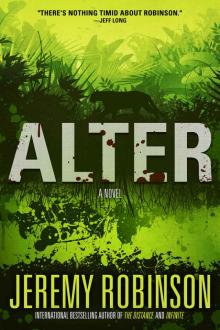 Alter
Alter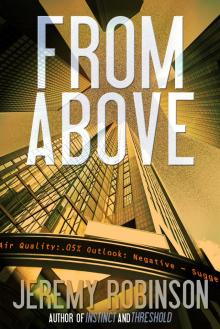 From Above - A Novella
From Above - A Novella Flux
Flux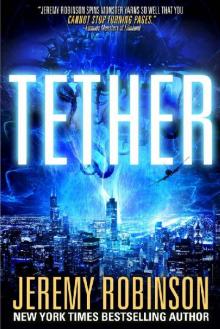 Tether
Tether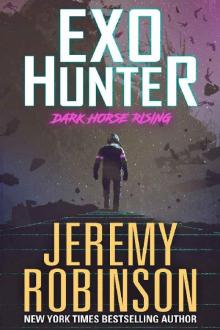 Exo-Hunter
Exo-Hunter Pulse
Pulse Cannibal
Cannibal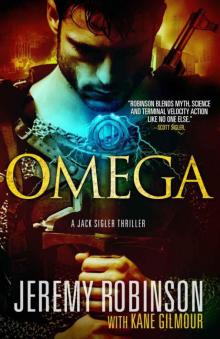 Omega: A Jack Sigler Thriller cta-5
Omega: A Jack Sigler Thriller cta-5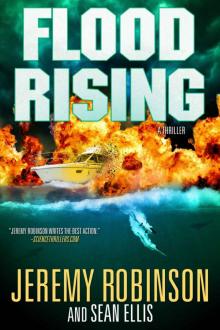 Flood Rising (A Jenna Flood Thriller)
Flood Rising (A Jenna Flood Thriller)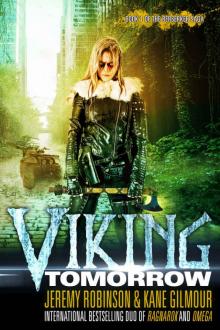 Viking Tomorrow
Viking Tomorrow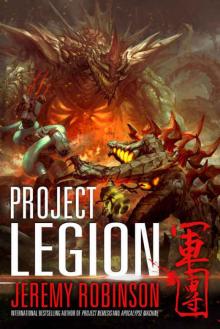 Project Legion (Nemesis Saga Book 5)
Project Legion (Nemesis Saga Book 5) BENEATH - A Novel
BENEATH - A Novel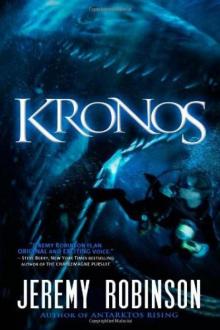 Kronos
Kronos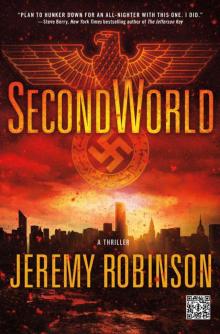 SecondWorld
SecondWorld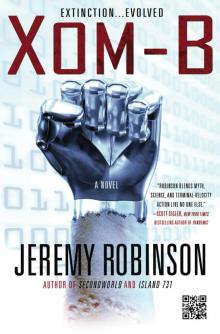 XOM-B
XOM-B Forbidden Island
Forbidden Island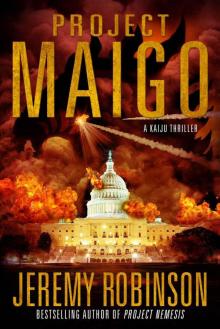 Project Maigo
Project Maigo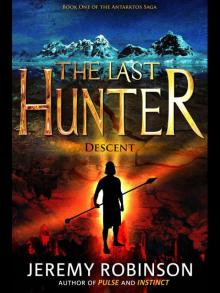 The Last Hunter - Descent (Book 1 of the Antarktos Saga)
The Last Hunter - Descent (Book 1 of the Antarktos Saga)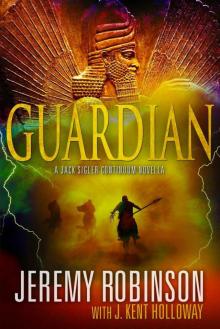 Jack Sigler Continuum 1: Guardian
Jack Sigler Continuum 1: Guardian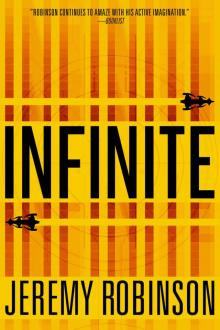 Infinite
Infinite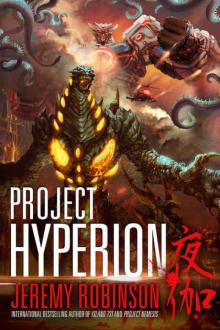 Project Hyperion
Project Hyperion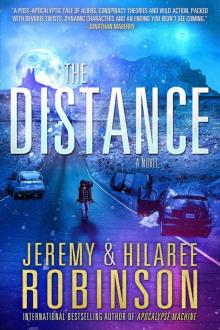 The Distance
The Distance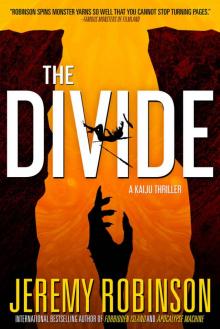 The Divide
The Divide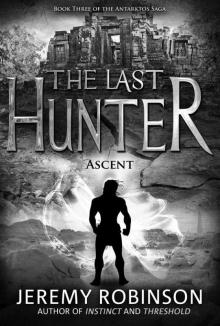 The Last Hunter - Ascent (Book 3 of the Antarktos Saga)
The Last Hunter - Ascent (Book 3 of the Antarktos Saga)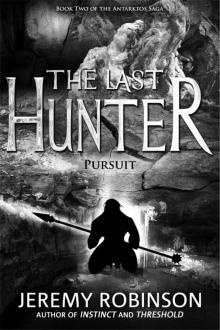 The Last Hunter - Pursuit (Book 2 of the Antarktos Saga)
The Last Hunter - Pursuit (Book 2 of the Antarktos Saga)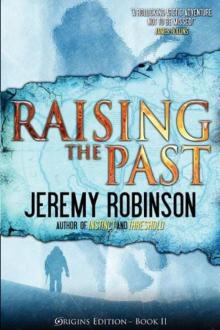 Raising the Past
Raising the Past The Others
The Others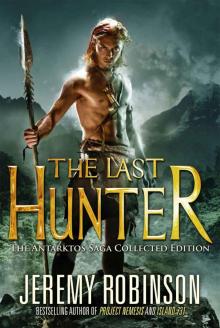 The Last Hunter - Collected Edition
The Last Hunter - Collected Edition Threshold
Threshold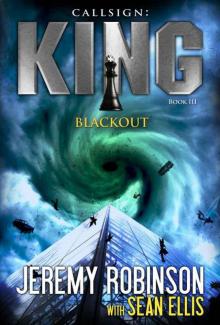 Blackout ck-3
Blackout ck-3 Antarktos Rising
Antarktos Rising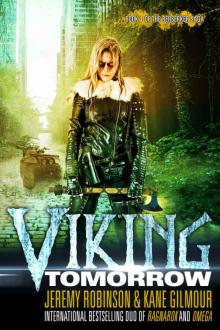 Viking Tomorrow (The Berserker Saga Book 1)
Viking Tomorrow (The Berserker Saga Book 1) The Didymus Contingency
The Didymus Contingency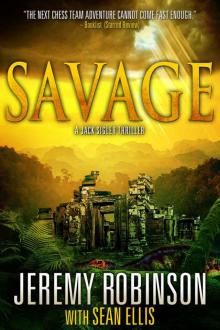 Savage (Jack Sigler / Chess Team)
Savage (Jack Sigler / Chess Team)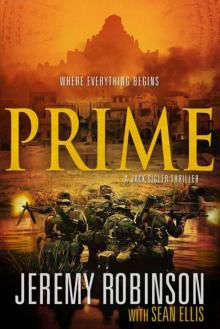 Prime
Prime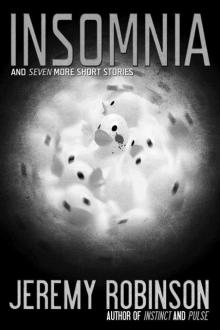 Insomnia and Seven More Short Stories
Insomnia and Seven More Short Stories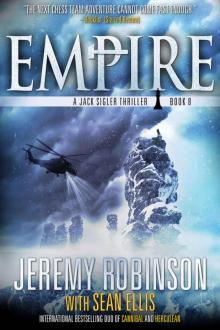 Empire (A Jack Sigler Thriller Book 8)
Empire (A Jack Sigler Thriller Book 8)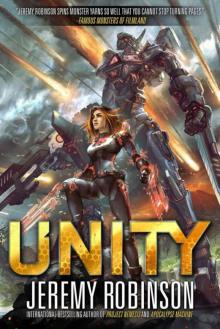 Unity
Unity Instinct
Instinct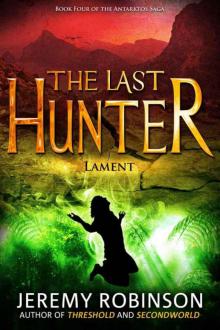 The Last Hunter - Lament (Book 4 of the Antarktos Saga)
The Last Hunter - Lament (Book 4 of the Antarktos Saga)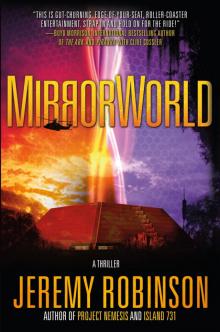 MirrorWorld
MirrorWorld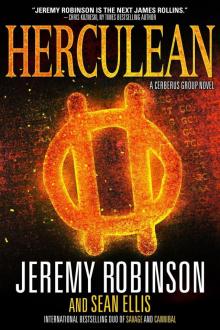 Herculean (Cerberus Group Book 1)
Herculean (Cerberus Group Book 1)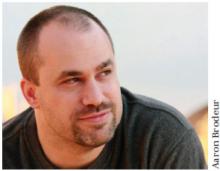 Island 731
Island 731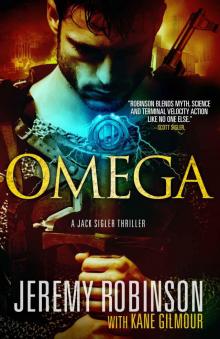 Omega: A Jack Sigler Thriller
Omega: A Jack Sigler Thriller Patriot (A Jack Sigler Continuum Novella)
Patriot (A Jack Sigler Continuum Novella)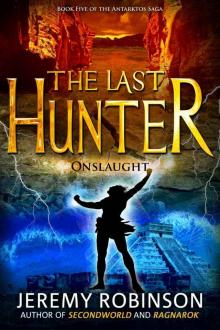 5 Onslaught
5 Onslaught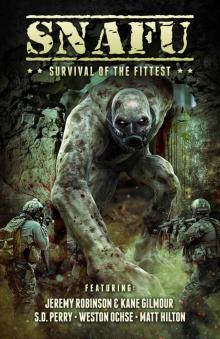 SNAFU: Survival of the Fittest
SNAFU: Survival of the Fittest Helios (Cerberus Group Book 2)
Helios (Cerberus Group Book 2)